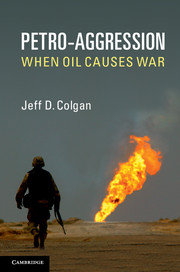Book contents
- Frontmatter
- Contents
- Figures
- Tables
- Acknowledgments
- 1 Introduction
- 2 A theory of oil, revolution, and conflict
- 3 Evidence and research design
- 4 Quantitative impact of oil and revolution on conflict
- 5 Iraq
- 6 Libya and the Arab Jamahiriyya
- 7 Iran
- 8 Venezuela and the Bolivarian Revolution
- 9 Saudi Arabia
- 10 Does oil cause revolution?
- 11 Conclusion and policy implications
- References
- Index
7 - Iran
Published online by Cambridge University Press: 05 February 2013
- Frontmatter
- Contents
- Figures
- Tables
- Acknowledgments
- 1 Introduction
- 2 A theory of oil, revolution, and conflict
- 3 Evidence and research design
- 4 Quantitative impact of oil and revolution on conflict
- 5 Iraq
- 6 Libya and the Arab Jamahiriyya
- 7 Iran
- 8 Venezuela and the Bolivarian Revolution
- 9 Saudi Arabia
- 10 Does oil cause revolution?
- 11 Conclusion and policy implications
- References
- Index
Summary
The greatest threat to Islam in Iran since the revolution has been the experience of living under the Islamic Republic.
– Mehdi BazarganOf all of the political transformations to occur in petrostates, the Iranian Revolution of 1979 was perhaps the most dramatic. The fall of the Shah and the return of Ayatollah Khomeini set in motion a series of social, political, and economic transformations that profoundly recast public life in Iran from then onwards. The revolutionary regime also was and continues to be perceived as an aggressive actor by its neighbors. Post-revolutionary Iran has been involved in a series of international conflicts that include the Iran–Iraq War, the American embassy hostage crisis, and the tensions surrounding Iran’s alleged nuclear program.
As with the previous two chapters, one of the principal aims of this chapter is to evaluate the theory posited in Chapter 2. The actual history of Iran, however, does not fit neatly in a box. For instance, although Iran has been aggressive in many instances, it has also been remarkably restrained at other times, even in the face of significant threats and provocations from other countries, not least of which came from the United States. This chapter therefore tries to capture the complexity and contradictions of Iran’s domestic and foreign politics. Only by recognizing that complexity can we hope to learn from it.
- Type
- Chapter
- Information
- Petro-AggressionWhen Oil Causes War, pp. 152 - 189Publisher: Cambridge University PressPrint publication year: 2013



